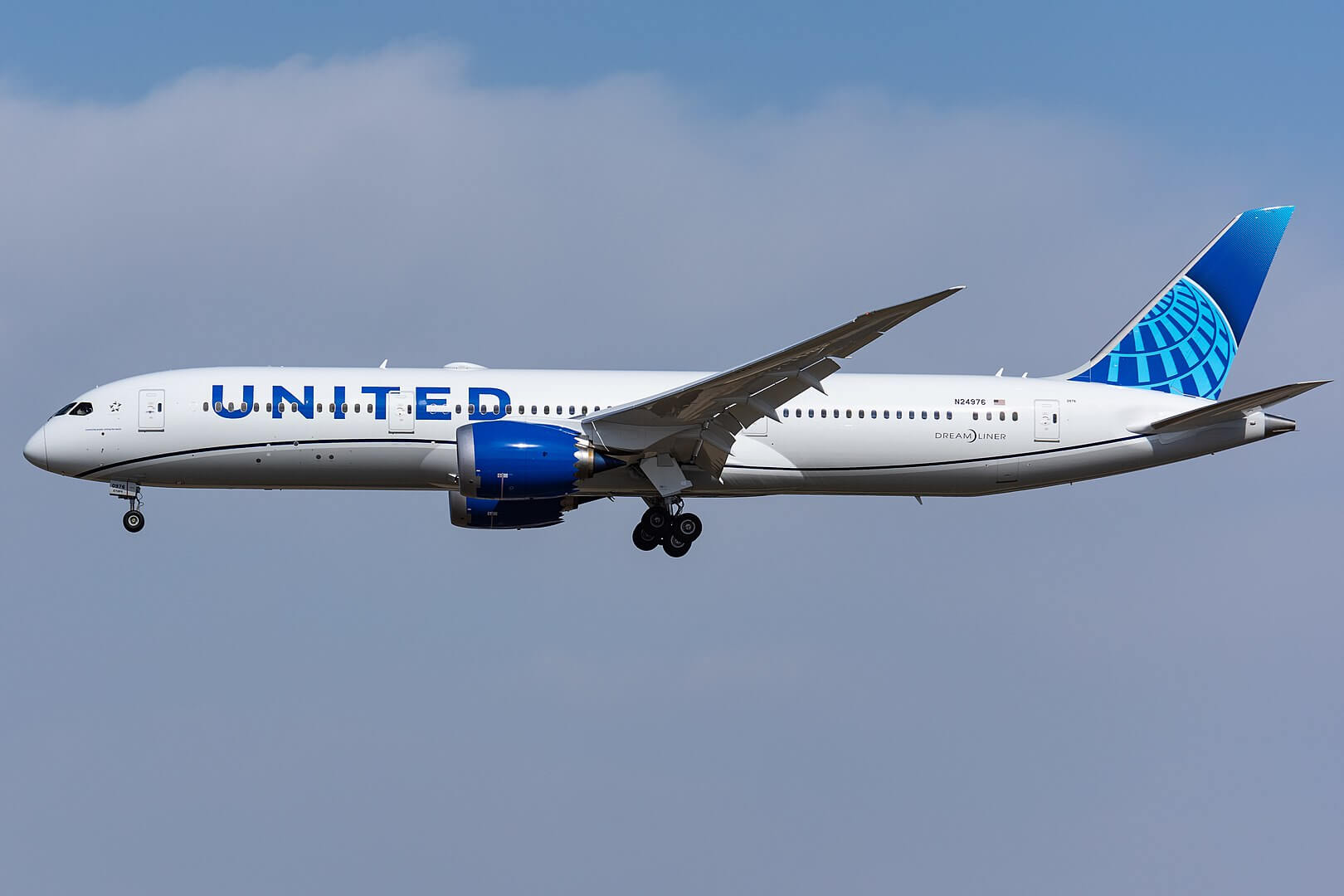Israeli reporter shamed by United Airlines staff after refusing to change seats for ultra-Orthodox men

A United Airlines flight. Courtesy of Wikimedia Commons
This article originally appeared on Haaretz, and was reprinted here with permission. Sign up here to get Haaretz’s free Daily Brief newsletter delivered to your inbox.
An Israeli journalist reported being pressured to change seats on an international flight on Tuesday, complaining that she was told by airline staff that any flight delays caused by ultra-Orthodox men attempting to enforce gender segregation would be her fault.
In a tweet, Neria Kraus, a U.S.-based correspondent for Channel 13 News, wrote that she had been asked to move by ultra-Orthodox men and alleged that she received no assistance after she turned to the United Airlines flight crew for help.
“What a sense of humiliation that United’s stewardess in charge, an Israeli who speaks Hebrew, approached me and shouted at me that the flight will not take off. And if they do fly, the flight will have to stop in Egypt because of me,” Kraus tweeted, thanking two other Israeli passengers who supported her.
A spokesperson for United Airlines in Israel said that the airline had “offered the customer another seat — which was declined — the flight departed for New York/Newark and is expected to arrive on time.”
A later tweet by United Airlines apologized to Kraus and said that they “would like to look … further” into the incident.
Hi there, Neria. We deeply apologize for this interaction and would like to look into this further. When you have a moment, please DM your confirmation number and further information about this situation. ^DK https://t.co/Y6hG6u3i8R
— United Airlines (@united) August 15, 2023
“The air attendant came and just started yelling at me,” Kraus told Haaretz in a WhatsApp message from the flight. “I refused to move because I’m a woman. This is pure discrimination.”
“She said ‘this flight will not take off because of you, you’re the reason why this flight will not take off. Because of you they will land in Egypt,’” Kraus, who managed to keep her seat after a man sitting next to her found a woman to switch seats with him, recalled.
“And everybody was really upset. People did not understand why she was saying that. I was humiliated in front of the entire airplane because of my gender.”
A @united crew member yelled at me that the flight to NYC won’t take off because of me - after I refused to Ultra Orthodox passengers’ request to change my seat. I was told the flight might touch down in Egypt and it would be my fault. What a humiliating event for me as a woman.
— נריה קראוס Neria Kraus (@NeriaKraus) August 15, 2023
National Council of Jewish Women CEO Sheila Katz commented on the incident, saying: “Women are human beings, who have rights. If a man does not wish to sit in his assigned seat next to a woman, it is not her responsibility to accommodate him. Any corporation that suggests otherwise engages in discrimination.”
In recent years, male ultra-Orthodox passengers on flights to and from Israel have increasingly refused to sit next to women, with travelers reporting clusters of ultra-Orthodox men approaching female passengers prior to take-off and requesting to switch seats.
In one 2014 incident, a Delta flight from New York to Israel was delayed when ultra-Orthodox passengers refused to sit between women. A similar incident occurred in 2018 when an El Al Israeli Airlines flight from New York to Tel Aviv was delayed by more than half an hour for the same reason.

That case led Nice, one of Israel’s biggest high-tech companies, to announce that it would bar its employees from flying El Al Airlines until the carrier ceased its practice of moving female passengers from seats next to ultra-Orthodox passengers.
The previous year, an Israeli court ruled that flight attendants for Israeli airlines could not legally ask women to switch seats to accommodate ultra-Orthodox men who won’t sit next to them in response to a lawsuit by Renee Rabinowitz, a Holocaust survivor and grandmother who had been asked to move to a different seat on a 2015 El Al flight.
However, this has not stopped discrimination on flights to and from Israel, with British airline easyJet paying an undisclosed amount to an Israeli-British woman in 2021, after a flight attendant offered her a hot beverage to convince her to switch seats in order to accede to an ultra-Orthodox passenger’s request.
There is no problem sitting next to a woman on public transportation according to Jewish law, asserted Shoshanna Keats Jaskoll, co-founder of the Orthodox feminist group Chochmat Nashim, asserting that “we in the religious community have allowed this by erasing women. When we erase women’s images, we get used to the idea that women aren’t there, and then we expect women not to be there in person.”
Elements of the ultra-Orthodox community have long tried to erase images of women from the public sphere through vandalism and by blurring their faces in news coverage.
“The pandemic is spreading,” said Orly Erez-Likhovski, the Executive Director of the Israel Religious Action Center, referring to what she described as a recent uptick in incidents of discrimination against women on public transportation.
The center, also known as IRAC, is the advocacy arm of the Reform movement in Israel and has gone to court to advocate for women in numerous discrimination cases.
Asked for comment, a spokesperson for United in Israel said that the airline had “offered the customer another seat – which she declined – and the flight departed for New York/Newark and is expected to arrive on time.”
“We’ve had quite a few cases against airline companies for asking women to switch seats just because of their gender, and we won a case against El Al and other companies, and we are actually now conducting a case against United” in connection with an unrelated incident which happened last March, she said. “They can’t accept such a request. It’s unequivocally illegal.”
The latest incident involving Kraus happened only a day after Prime Minister Benjamin Netanyahu declared that “Israel is a free country in which no one will restrict who can use public transportation, and no one will dictate where she or he will sit.”
He was responded to a series of incidents where women were asked to move to the back seats on buses or avoid using public transportation.
Ben Samuels contributed to this piece.

I hope you appreciated this article. Before you go, I’d like to ask you to please support the Forward’s award-winning, nonprofit journalism during this critical time.
Now more than ever, American Jews need independent news they can trust, with reporting driven by truth, not ideology. We serve you, not any ideological agenda.
At a time when other newsrooms are closing or cutting back, the Forward has removed its paywall and invested additional resources to report on the ground from Israel and around the U.S. on the impact of the war, rising antisemitism and the protests on college campuses.
Readers like you make it all possible. Support our work by becoming a Forward Member and connect with our journalism and your community.
Make a gift of any size and become a Forward member today. You’ll support our mission to tell the American Jewish story fully and fairly.
— Rachel Fishman Feddersen, Publisher and CEO
Join our mission to tell the Jewish story fully and fairly.























